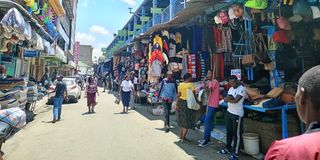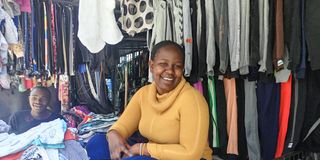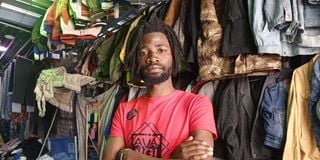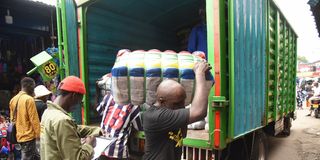Inside the world of Nakuru mitumba traders

A trader arranges a mitumba depot at Nasha market on September 14, 2023.
With the announcement by the government on plans for another round of additional taxes, second hand clothes traders (mitumba traders) in Nakuru are expressing concerns on how this will affect their business.
Most of them expressed their apprehension on the newly proposed 18 per cent value-added tax (VAT) from the current 16 per cent. The proposed 18 per cent tax is meant to get Kenya at par with other East African Community (EAC) member states imposing tax at this rate.

Traders display their mitumba clothes at Nasha market on September 14, 2023.
Mtaa Wangu visits Nasha Market where mitumba traders are lamenting on the effects of the recent changes.
According to traders selling children’s clothes, Rael Abara, notes that they are taken aback by the consistent announcement by the government on increasing tax noting that in her five years of selling mitumba, the government has never given them an incentive but instead increases tax in their sector.

Rael Abara selling children's clothes at Nasha market on September 14, 2023.
“Just recently the government increased VAT from eight per cent to 16 per cent. I have not settled on the effects of the previous changes. Here comes a proposition for yet other changes. These drastic changes can cause ulcers to a business person,” she says.
Ms Abara says in August 2022, she would purchase a bale for Sh 23,000. However, she now has to part with Sh 30,000 to get a good bale.
Brian Silweyz, also a trader at Nasha says life is getting unbearable with tax increments now and then. He faults the government for imposing high tax on mitumba imports in the name of saving the textile industry in Kenya.

Brian Silweyz at his shop in Nasha market during an interview with Mtaa Wangu on September 14, 2023.
“We are equally tax payers. While the cotton industry was dead in the country, second hand traders stepped in and took up the space, which offered employment to thousands of people in Nakuru. It is then absurd for them to step on us with a 25 per cent tax on mitumba imports, citing to promote one industry while killing another, “he laments.
Additionally, he says getting a bale to sell is also a challenge. Other than that, clients who previously picked clothes from him to resell are no longer buying clothes for resale citing the high cost of buying them in pieces.
Jonson Maina, a businessman who imports mitumba bales and doubles as the Nakuru representative of the Rift Valley Mitumba Consortium, says the sector has been hard hit by the inflation rate, following the rise of the dollar value by 25 - 30 percent. He says more unfriendly change will make this sector collapse.
“We are currently bracing the effects of the value-added tax (VAT) on petroleum products being increased to 16 per cent from the current 8 per cent. As industry players we are bracing the effects of the dollar and 16 per cent VAT. Getting us to the 25 percent tax on mitumba imports and 18 per cent VAT will cripple use as business people,” say Maina.
As an effect to these changes, Maina who owns a mitumba deport in Nakuru says he has resorted to paying his staff on commission contrary to their previous monthly pay slip plan.

A trader offloads a bale of mitumba clothes at Nasha market on September 14, 2023.
“Rather than retrenching my employees we got into an agreement to have them paid depending on the sales they make in a day. This is how devastating the situation is getting,” says Maina.
This comes as these trader’s stare at a proposed 25 percent taxation on imported textile proposed in August last month by Trade CS Moses Kuria.
According to Kuria, the proposal to impose the 25 percent tax on imported textiles is to encourage Kenyans to promote locally manufactured clothes as well as boost Kenya's cotton and textile industry.
